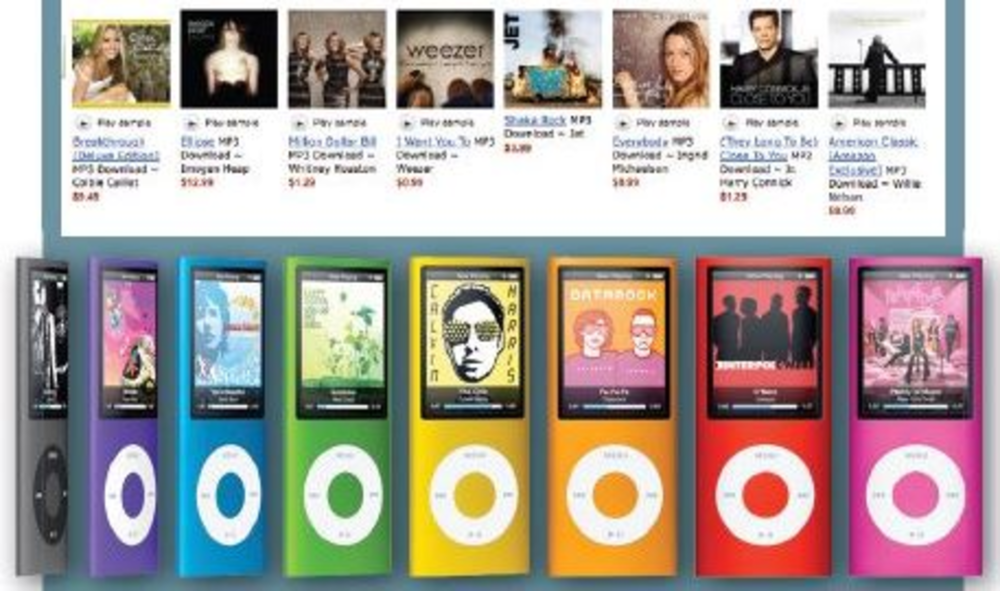Even though sales are declining, CDs continue to be the dominant music delivery format in the US. However, with the volume of digital music downloads quickly catching up to CD numbers, marketers are now looking for ways to further capitalize on the growing interest among consumers in digital music.
Apple is the dominant player in the digital music space, with both the leading digital music player — the iPod — as well as the leading online source for digital music downloads — iTunes. The iTunes digital music store accounted for 69% of the digital music market in the first half of 2009, according to The NPD Group’s Music Watch. The second biggest player is AmazonMP3, but it only claims 8% of the market.
A key driver of digital music adoption has been the popularity of the iPod, which has now been on the market for several years.
“We’re seeing that MP3 player sales have started to flatten out,” says Russ Crupnick, VP, senior industry analyst for The NPD Group’s entertainment division. Device penetration is particularly high among young consumers, he adds.
Rather than trying to get new consumers into the market as they have in the past, digital music marketers are now looking for ways to encourage MP3 users to download more songs, thus using their existing MP3 players more often, Crupnick explains.
Apple, for example, is working with record labels on a way to engage digital music fans with additional content. The new digital music format, Cocktail, will bundle photos, videos, lyrics and other assets to create a digital version of the record sleeves that used to contain albums.
Another incentive on iTunes is the Complete My Album option, which allows fans to purchase the remaining content of an album from which they’ve purchased only a few song at a discount. And, ITunes Pass lets fans pay one price to receive a variety of content from one artist during a set period of time.
Online retailers who would like a slice of iTunes’ digital music download pie need to “seamlessly blend music into the online experience,” says Baris Karadogan, CEO at Hip Digital Media.
Hip Digital Media offers a digital music engine that enables any online marketer to offer digital music downloads without having to acquire any music licenses. In the UK, Hip Digital powers the Web site NectarMusicStore.com, where members of the coalition loyalty program Nectar can redeem points earned by shopping at Amazon, eBay, Sainsbury and others for a wide variety of MP3 downloads.
“People are going to buy digital music anyway,” says Karadogan, noting that the product is a very easy up-sell on many retailers’ Web sites.
Consumer packaged goods brands understand the popularity of digital downloads and frequently include a code that can be redeemed online for a free music download as part of their promotions.
“Music and branding is a very powerful idea,” said Crupnick. However, “the space needs to be defined a little bit better,” he continued, because right now it’s not clear who is benefiting from these efforts — the artist, the label or the brand.
Marketers are also trying to figure out how to capitalize on social networking-based digital music services such as MySpace’s iLike.
“You start to wonder whether the idea of ownership of music is going to give way because consumers can have music anywhere they want it,” said Crupnick. “This is an emerging trend we should be watching because it could have an impact on digital downloads.”
More sophisticated mobile phones present another way for consumers to access digital music and for marketers to reach them, said Brad Navin, EVP and GM at digital music distributor The Orchard.
“Mobile presents a tremendous opportunity for digital music in the US,” as it already is in Europe, says Navin.
CDs accounted for 65% of all music sold in the first half of 2009 with paid digital downloads comprising the remaining 35%. However, paid digital downloads are growing quickly, having accounted for 20% of sales in 2007 and 30% in 2008. By the end of 2010, NPD predicts digital music sales will nearly equal CD sales.





